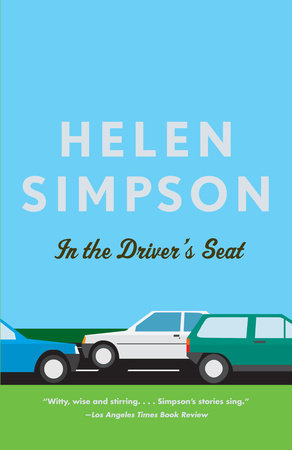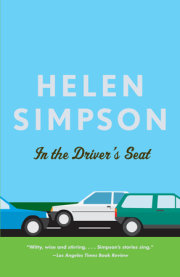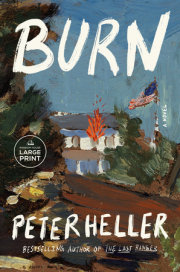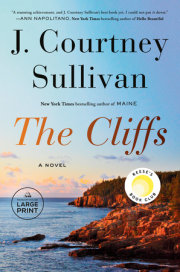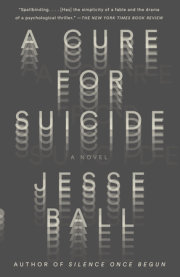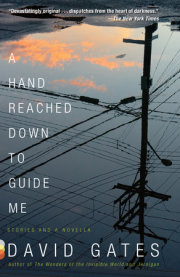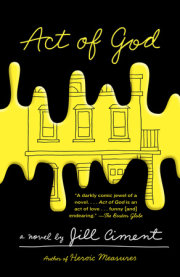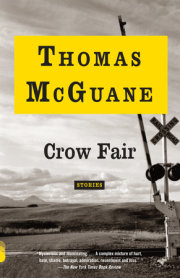Up at a VillaThey were woken by the deep-chested bawling of an angry baby. Wrenched from wine-dark slumber, the four of them sat up, flustered, hair stuck with pine needles, gulping awake with little light breaths of concentration. They weren't supposed to be here, they remembered that.
They could see the baby by the side of the pool, not twenty yards away, a furious geranium in its parasol-shaded buggy, and the large pale woman sagging above it in her bikini. Half an hour ago they had been masters of that pool, racing topless and tipsy round its borders, lithe Nick chasing sinewy Tina and wrestling her, an equal match, grunting, snaky, toppling, crashing down into the turquoise depths together. Neither of them would let go underwater. They came up fighting in a chlorinated spume of diamonds. Joe, envious, had tried a timid imitation grapple but Charlotte was having none of it.
"Get off!" she snorted, kind, mocking, and slipped neatly into the pool via a dive that barely broke the water's skin. Joe, seeing he was last as usual, gave a foolish bellow and launched his heavy self into the air, his aimless belly slapping down disastrously like an explosion.
After that, the sun had dried them off in about a minute, they had devoured their picnic of
pissaladière and peaches, downed the bottles of pink wine, and gone to doze in the shade behind the ornamental changing screen.
Now they were stuck. Their clothes and money were heaped under a bush of lavender at the other end of the pool.
"Look," whispered Tina as a man came walking toward the baby and its mother. "Look, they're English. He's wearing socks."
"What's the matter with her now," said the man, glaring at the baby.
"How should I know," said the woman. "I mean, she's been fed. She's got a new nappy."
"Oh, plug her on again," said the man crossly, and wandered off toward a cushioned chaise longue. "That noise goes straight through my skull."
The woman muttered something they couldn't hear, and shrugged herself out of her bikini top. They gasped and gaped in fascination as she uncovered huge brown nipples on breasts like wheels of Camembert.
"Oh gross!" whispered Tina, drawing her lips back from her teeth in a horrified smirk.
"Be quiet," hissed Nick as they all of them heaved with giggles and snorts and their light eyes popped, overemphatic in faces baked to the color of flowerpots.
They had crept into the grounds of this holiday villa, one of a dozen or more on this hillside, at slippery Nick's suggestion, since everything was
fermé le lundi down in the town and they had no money left for entrance to hotel pools or even to beaches. Anyway, they had fallen out of love over the last week with the warm soup of the Mediterranean, its filmy surface bobbing with polystyrene shards and other unsavory orts.
"Harvey," called the woman, sagging on the stone bench with the baby at her breast. "Harvey, I wish you'd . . ."
"Now what is it," said Harvey testily, making a great noise with his two-day-old copy of
The Times.
"Some company," she said with wounded pathos. "That's all."
"Company," he sighed. "I thought the idea was to get away from it all."
"I thought we'd have a chance to
talk on holiday," said the woman.
"All right, all right," said Harvey, scrumpling up
The Times and exchanging his chaise longue for a place on the stone bench beside her. "All right. So what do you want to talk about?"
"Us," said the woman.
"Right," said Harvey. "Can I have a swim first?" And he was off, diving clumsily into the pool, losing his poise at the last moment so that he met the water like a flung cat.
"She's hideous," whispered Tina. "Look at that gross stomach, it's all in folds." She glanced down superstitiously at her own body, the high breasts like halved apples, the handspan waist.
"He's quite fat, too," said Charlotte. "Love handles, anyway."
"I'm never going to have children," breathed Tina. "Not in a million years."
"Shush," said Joe, straining forward for the next installment. The husband was back from his swim, shaking himself like a labrador in front of the nursing mother.
"'Us,'" he said humorously, wiggling a finger inside each ear, then drubbing his hair with the flats of his hands. "Fire away then."
She started immediately, as if she knew she had only two or three minutes of his attention, and soon the air was thick with phrases like Once she's on solids, and You'd rather be reading the paper, and Is it because you wanted a boy? He looked dull but resigned, silent except for once protesting, What's so special about bathtime? She talked on, but like a loser, for she was failing to find the appropriate register, flailing around, pulling clichés from the branches. At some subliminal level each of the eavesdropping quartet recognized their own mother's voice in hers, and glazed over.
"You've never moaned on like this before," marveled Harvey at last. "You were always so independent. Organized."
"You think I'm a mess," she said. "A failure as a mother."
"Well, you're obviously not coping," he said. "At home all day and you can't even keep the waste bins down."
Nick and Tina were laughing with silent violence behind the screen, staggering against each other, tears running down their faces. Joe was mesmerized by the spectacle of lactation. As for Charlotte, she was remembering another unwitting act of voyeurism, a framed picture from a childhood camping holiday.
It had been early morning, she'd gone off on her own to the village for their breakfast baguettes, and the village had been on a hill like in a fairy tale, full of steep little flights of steps, which she was climbing for fun. The light was sweet and glittering and as she looked down over the rooftops she saw very clearly one particular open window, so near that she could have lobbed in a ten franc piece, and through the window she could see a woman dropping kisses onto a man's face and neck and chest. He was lying naked in bed and she was kissing him lovingly and gracefully, her breasts dipping down over him like silvery peonies. Charlotte had never mentioned this to anyone, keeping the picture to herself, a secret snapshot protected from outside sniggerings.
"The loss of romance," bleated the woman, starting afresh.
"We haven't changed," said Harvey stoutly.
"Yes we have! Of course we have!"
"Rubbish."
"But we're
supposed to change, it's all different now, the baby's got to come first."
"I don't see why," said Harvey. "Mustn't let them rule your life."
The baby had finished at last, and was asleep; the woman gingerly detached her from her body and placed her in the buggy.
"Cheer up," said Harvey, preparing for another dip. "Once you've lost a bit of weight, it'll all be back to normal. Romance et cetera. Get yourself in shape."
"You don't fancy me anymore," she wailed in a last-ditch attempt to hold him.
"No, no, of course I do," he said, eyeing the water. "It's just a bit . . . different from before. Now that you've gone all, you know, sort of floppy."
That did it. At the same moment as the woman unloosed a howl of grief, Nick and Tina released a semi-hysterical screech of laughter. Then—"Run!" said Joe—and they all shot off round the opposite side of the pool, snatching up their clothes and shoes and purses at the other end. Harvey was meanwhile shouting, "Hoi! Hoi! What the
hell d'you think you're playing at!" while his wife stopped crying and his daughter started.
The four of them ran like wild deer, leaping low bushes of lavender and thyme, whooping with panicky delight, lean and light and half naked—or, more accurately, nine tenths naked—through the pine trees and
après-midi dappling. They ran on winged feet, and their laughter looped the air behind them like chains of bubbles in translucent water.
High up on the swimming pool terrace the little family, frozen together for a photographic instant, watched their flight open-mouthed, like the ghosts of summers past; or, indeed, of summers yet to come.
Copyright © 2007 by Helen Simpson. All rights reserved. No part of this excerpt may be reproduced or reprinted without permission in writing from the publisher.

